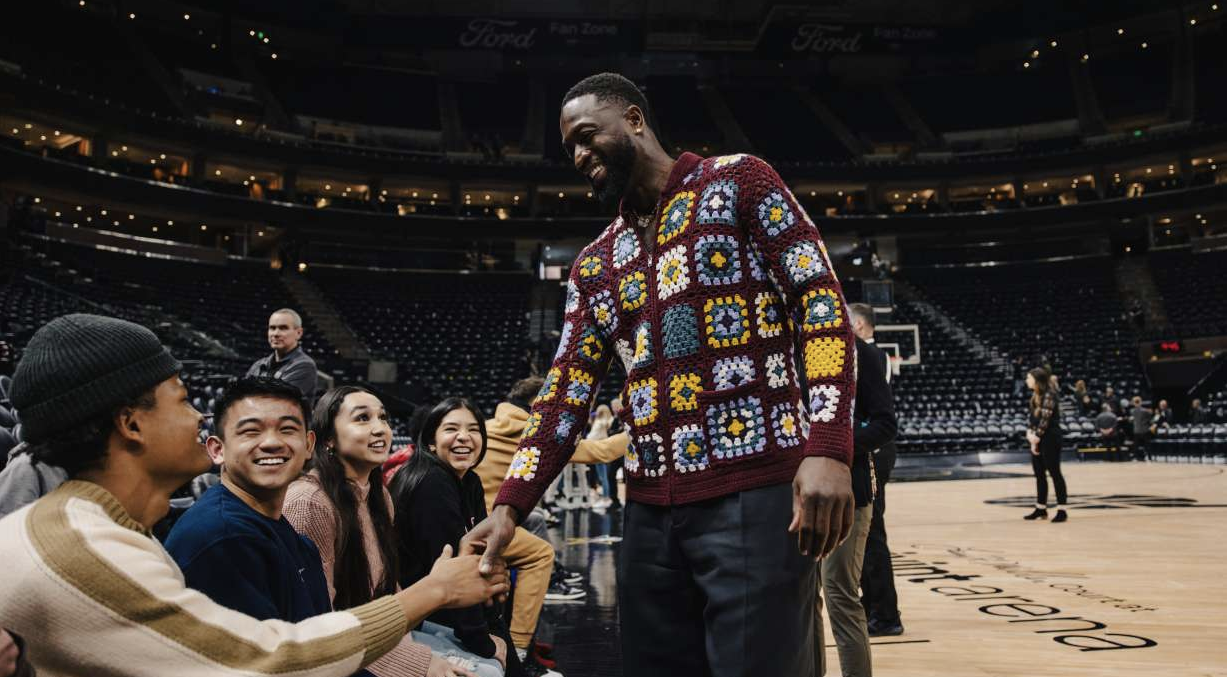SALT LAKE CITY — All-Star Weekend may be over, but the NBA Foundation left behind almost $1 million to boost Utah’s Black community.
The $1 million comes in the form of a series of grants for both local nonprofits and national nonprofits with a presence in the state. The funds will be used for a number of initiatives focused on Utah’s Black community, ranging from mental health to student success.
The six grantees are Black Physicians Utah; the University of Utah’s Black Cultural Center and Historically Black Colleges and Universities Partnership; Big Brothers Big Sisters of America; Community Options, which supports individuals with disabilities; and 10,000 Degrees and INROADS, which both help low-income and diverse high school and college students.
The NBA Foundation was established in 2020 out of the league’s desire to figure out how to be a leader in the social justice space following the murders of George Floyd and others, according to executive director Greg Taylor. The organization focuses on driving economic opportunity and empowerment in the Black community.
“When we look at young people, we know that Black young people are not a monolithic group. So we focus on organizations that invest in and work with young people who are court-involved all the way to the valedictorian in their schools and everybody in between,” Taylor said. “There are Black young people here in Utah that are doing great work that have every aspiration and every dream of other young people, and the question is, ‘Can we work with nonprofits to really meet those young people where they are and meet their unique challenges?'”
Black student success
A number of the grantees will focus on Black student success, a focus that stems from educational inequity facing Black students. For example, Black college students are more likely to attend schools with fewer resources and are less likely to attain college degrees.
One of the grantees, California-based 10,000 Degrees, will use its grant to build on its two-year partnership with the NBA’s Utah Jazz to increase the number of Black students in Utah who enroll in and graduate from college. The nonprofit is using the grant to hire two full-time positions as well as 14 student ambassadors, seven of whom will be in Utah. The goal is that those hires will help with outreach to both college and high school students.
“One of the things that we have noticed in Utah is that there is essentially little to no support on the ground in high schools to help students who are historically underrepresented in higher education to actually think about and plan for college,” 10,000 Degrees CEO and President Kim Mazzuca said. “This particular grant is helping us put people on the ground in Utah who will be reaching out to our Black student community and providing wraparound support to get them to college, through college and then launching them into a career that meets their skill set and interests.”
The University of Utah, another grantee, is also using its grant to promote Black student success. The university received $50,000 each from the NBA Foundation and Pepsi. The money will go toward the U.’s Black Cultural Center’s initiatives and its Historically Black Colleges and Universities Partnership, which brings about 25 HBCU students to Utah each summer for internships and professional development.
Black Cultural Center Director Meligha Garfield said the goal is to give Black students a holistic preparation for postgraduate success through things like professional mixers, workshops that help students develop interests outside their majors, trips to Historically Black Colleges and Universities, and summer internships.
“We just don’t throw them out there and say, ‘Hey, this is what you got to do find a job and we will stop communication.’ What we would love to do is make sure that our students feel that they belong here, not only during their collegiate career here at the University of Utah but that after they graduate, they have opportunities and we’re cultivating spaces for them to kind of thrive.”
Rodney Cohen, the university’s Historically Black Colleges and Universities Partnership manager, added that his program helps expose students to the professional opportunities in Salt Lake City as well as postgraduate programs at the U.
Both Cohen and Garfield said they hope their programs are long-term investments in growing Utah’s Black community.
“When we bring many of our HBCU students here, and even the students that are currently here, it’s important for them to see that there is an albeit small, African American community in Salt Lake City,” Cohen said. “This serves as kind of a template for those students to say, ‘Hey, if I want to operate or exist in communities such as Salt Lake City, it is very possible and there’s a track record of success.'”
Big Brothers Big Sisters of Utah CEO Nancy Basinger agreed that having role models from similar backgrounds can be impactful for kids.
“Part of what leads you to understand that you could be successful in your future as a young person of color, is seeing adults of color as a role model,” Basinger said. “A city the size of Salt Lake would typically have a much larger Black population. I think here, maybe more than some places, Black boys are not seeing and spending time with Black men who could be positive role models in their lives.”
Big Brothers Big Sisters of Utah will use its grant to recruit more Black mentors and mentees, primarily Black youths and men, and emphasize college and career readiness. The organization’s goal is to make 50 mentor matches this year with the grant across its seven counties: Salt Lake, Weber, Davis, Utah, Summit, Wasatch and Washington.
She added that mentors can make a big impact with very little time commitment. In fact, the organization asks that mentors send one email a week and attend a two-hour meeting once a month.
“In about 20 hours in person a year and one extra email every week, they can really make a difference in the life of a child,” Basinger said.
Other needs
Community Options, a nonprofit supporting individuals with disabilities, is using its grant to focus on helping youth with disabilities get into employment services, with an emphasis on Black youths with disabilities.
Black Physicians of Utah received a grant from the NBA Foundation — which it will use for research internships for high school and undergraduate students — as well as a grant from the NBA Players Association — which will be used to address the mental health needs of Black Utahns by hosting a number of group sessions led by Black therapists, putting together a list of mental health resources and possibly supplementing uninsured or underinsured individuals’ access to therapy.
Dr. Erica Baiden — a family physician and member of Black Physicians of Utah — said the efforts, especially when it comes to the group sessions, highlight the importance of shared experiences in health care.
“Shared experience, especially in Black or underrepresented communities, is something that is an unspoken but shared commonality that is really important in how health care is accessed or achieved,” she said. “For example, in this group of Black men in Utah, what is that like? What are those microaggressions? What pressures are shared? Perhaps there’s some race-based trauma that is shared in that community that may not be understood or able to be expressed fully if it were in a setting that did not have representation like we’re trying to provide.”
Baiden also stressed the need for mental health resources that are specific to Black communities. For example, suicide is the third-leading cause of death for African Americans ages 15-24 and Black individuals of all ages are 20% more likely to experience serious mental health problems.
“The statistics are pretty jarring in terms of mental health in this community, specifically Black young men,” she said. “This is a concerning topic, and we’re really grateful to have this grant and to provide access and community and hopefully help with this concerning topic.”

